The Lisianthus flower is more than just a beautiful bloom; it carries deep spiritual meanings that connect with many aspects of life. Its symbolism includes purity, grace, strength, and heartfelt appreciation, making it a flower rich in spiritual significance. People often use the Lisianthus in moments of love, remembrance, and personal growth because of these powerful messages.
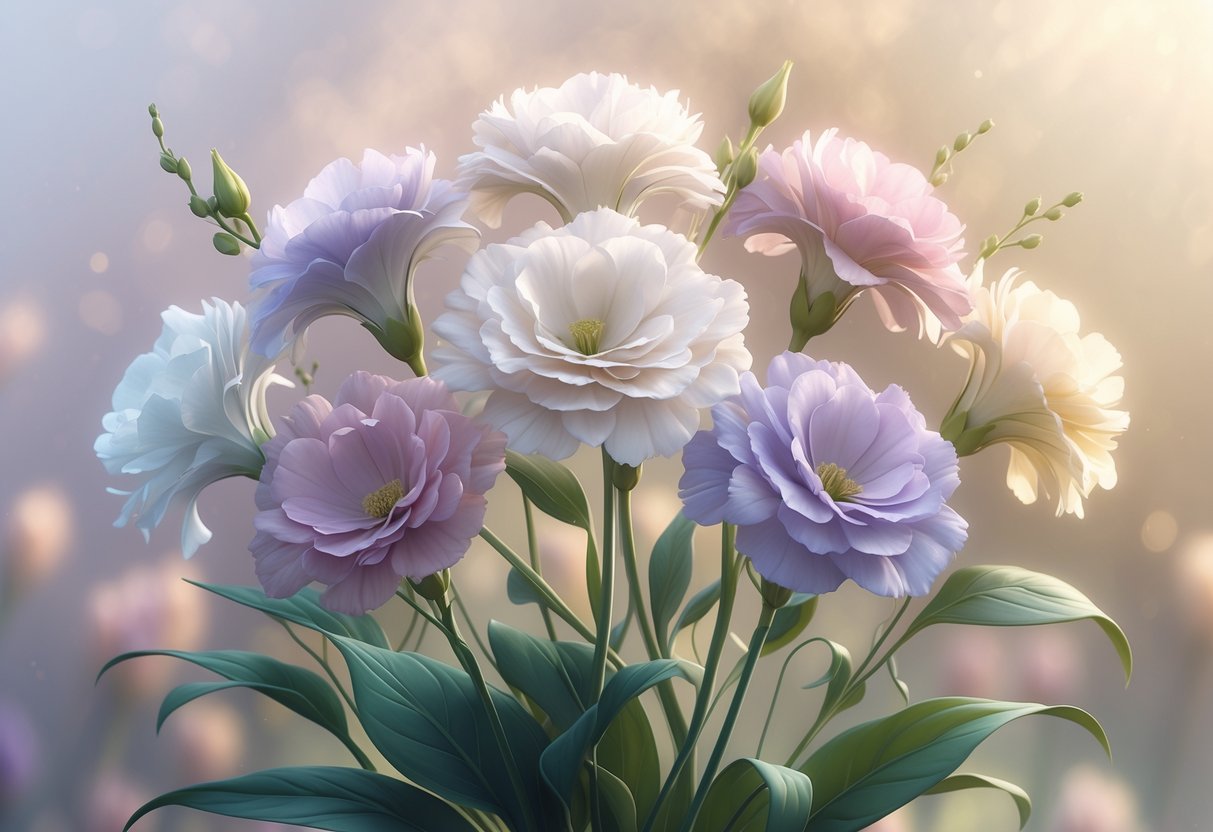
Each color of the Lisianthus adds another layer to its meaning, from peace and calm in blue to friendship and joy in yellow. This variety allows the flower to express feelings in many spiritual and emotional contexts. Understanding these meanings can deepen the connection to oneself and others, bringing insight and comfort.
Key Takeways
- The Lisianthus flower represents purity, grace, and strength.
- Its colors hold specific spiritual messages suited for different occasions.
- The flower is used to express deep emotional and spiritual connections.
Understanding the Lisianthus Flower
The Lisianthus flower is known for its delicate beauty and strong cultural presence. It has a rich botanical history and unique physical traits that set it apart from other flowers. Understanding its background and characteristics offers insight into why it holds such symbolic and spiritual value.
Botanical Background and Origins
The Lisianthus plant, scientifically named Eustoma grandiflorum, is native to warm regions of North and South America. It grows naturally in states such as Texas and Oklahoma, as well as in parts of Mexico, the Caribbean, and northern South America. It thrives in open fields and prairies, which provide the ideal environment for its growth.
This flower prefers well-drained soil and sunny areas, and it is able to adapt well to garden settings and containers. The Lisianthus is a hardy plant but requires care to maintain its delicate blooms, which appear mostly in the warmer months. Its origin in wild prairie lands contributes to its common associations with natural beauty and resilience.
Alternate Names: Eustoma and Prairie Gentian
The Lisianthus flower is also widely known as Eustoma, based on its scientific classification. This name derives from Greek roots that describe its graceful petals. Another common name is “Prairie Gentian,” which highlights its native habitat and resemblance to flowers in the Gentian family.
These alternate names reflect different aspects of the flower’s identity but refer to the same genus and species. The name Prairie Gentian connects the flower to open landscapes and natural purity. The scientific term Eustoma is used more often in horticulture and botanical contexts. Both names help clarify its classification and appearance.
Key Botanical Characteristics
The Lisianthus plant features smooth stems and glossy, oval leaves. Its flowers are known for their large, cup-shaped blooms with multiple soft petals. These petals often have a ruffled edge and come in a range of colors, including white, pink, purple, blue, and yellow.
The flowers bloom singly or in clusters at the top of the plant’s stems. They typically measure 2 to 3 inches wide and open gradually, presenting a layered and elegant look. The plant’s height ranges from one to three feet, making it suitable for cut flowers and floral arrangements.
Lisianthus blooms last a long time once cut, which is one reason they are popular in bouquets. The flower’s ability to thrive in both wild and cultivated settings demonstrates its adaptiveness and appeal.
Core Spiritual Meanings of Lisianthus Flowers
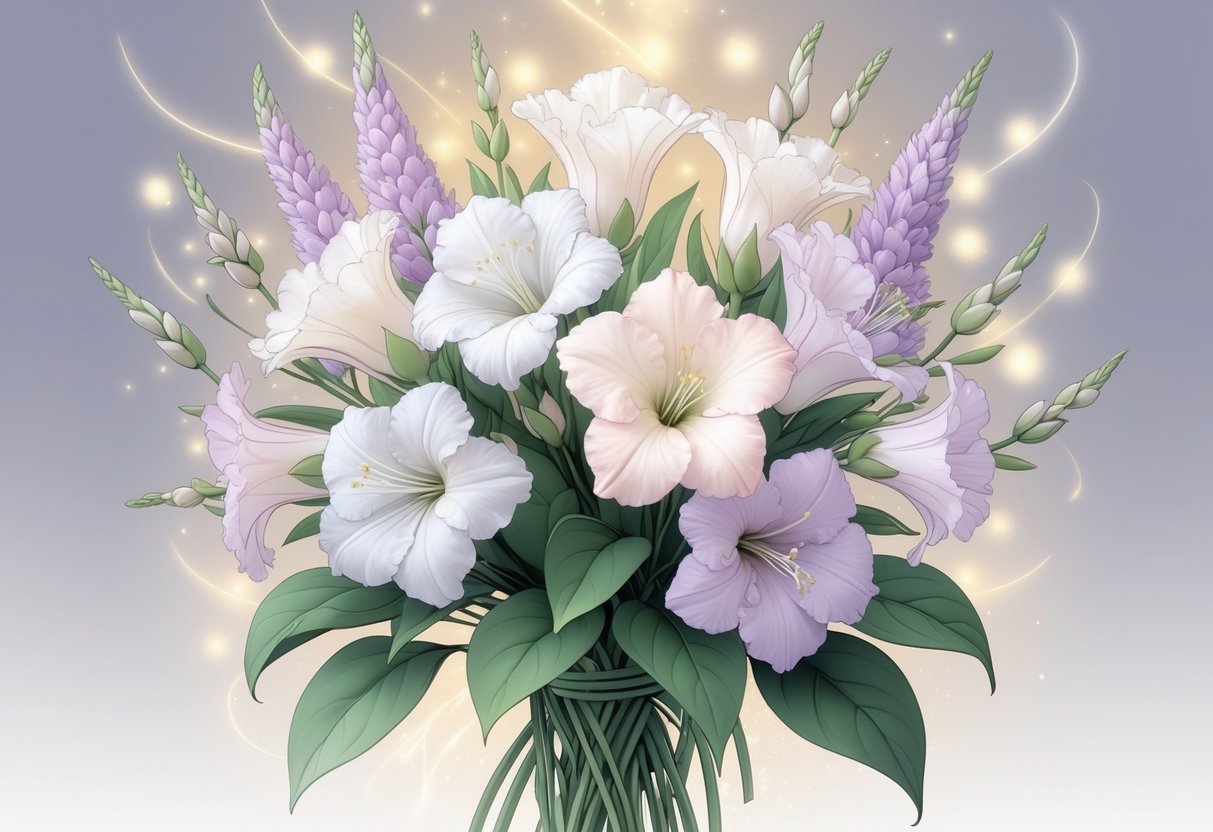
Lisianthus flowers carry layered spiritual meanings tied to personal growth, emotional connection, and lasting bonds. Their symbolism reflects qualities that inspire strength, respect, and deep affection in life.
Resilience and Inner Strength
The Lisianthus flower symbolizes resilience through its ability to bloom with delicate beauty despite harsh conditions. Its layered petals represent the inner strength people need to face challenges calmly and gracefully.
Spiritually, the Lisianthus encourages endurance and composure. It reminds individuals to maintain poise when life feels uncertain or difficult. The flower’s soft but firm structure is a metaphor for developing quiet confidence and persistence.
This meaning makes the Lisianthus a symbol of personal power and overcoming adversity without losing one’s gentle nature.
Gratitude and Appreciation
Lisianthus flowers express gratitude and respect clearly through their presence. They are often given to show thanks and heartfelt recognition for someone’s positive impact.
The flower’s elegant form reflects genuine appreciation, making it a fitting symbol for acknowledging kindness, guidance, or support. Its meaning includes a sense of honored respect toward mentors, friends, or loved ones.
In spiritual contexts, the Lisianthus calls for gratitude not just in relationships but also for life’s blessings, fostering a deeper understanding of interconnectedness and acknowledgment.
Love, Commitment, and Soul Bonds
In matters of the heart, the Lisianthus flower represents a refined and enduring love. It symbolizes not only romantic attraction but also respect and admiration for a partner’s character.
The flower conveys commitment that goes beyond surface beauty, highlighting long-term relationships built on mutual respect, loyalty, and understanding.
Lisianthus is used to embody soul bonds, where emotional depth and spiritual connection are as important as physical presence. It encourages nurturing love that grows stronger through trust and grace.
Color Symbolism in Lisianthus Flower Spiritual Meanings
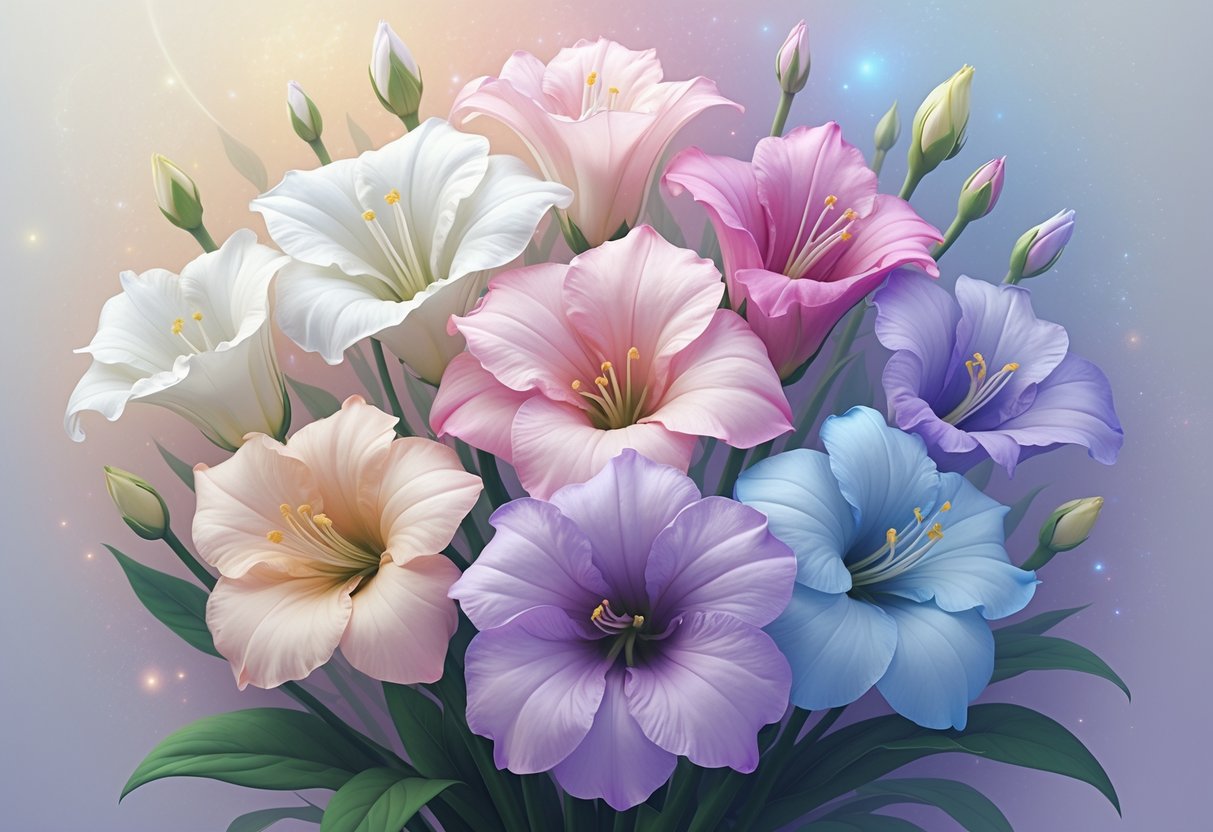
The colors of lisianthus flowers each carry a unique spirit and message. Their shades represent different emotions and qualities that are important in various spiritual and personal contexts. Understanding these meanings helps to choose the right flower color for expression or reflection.
White Lisianthus: Spirituality and Purity
White lisianthus symbolizes purity, innocence, and spiritual clarity. Its clean, soft color is often linked to peaceful energy and fresh beginnings. This color is commonly used in weddings and religious ceremonies because it represents a true and honest connection.
The white lisianthus also reflects humility and sincerity. It encourages calm and balance, making it fitting for moments of reflection or gratitude. Its association with purity is why it is often selected for rituals or events focusing on renewal and hope.
Purple Lisianthus: Royalty and Spiritual Wisdom
Purple lisianthus embodies qualities of royalty, dignity, and deep spiritual insight. This flower’s rich color has long been connected with power and creativity in many cultures.
The shade suggests wisdom, elegance, and a connection to higher understanding. Purple lisianthus is often present in settings where inspiration and inner strength are emphasized. It encourages respect for tradition while inviting imaginative and innovative thought.
Red Lisianthus: Passion and Energy
Red lisianthus stands for passionate love, strong emotions, and energetic drive. The vibrant red petals express intense feelings, often associated with romance and commitment.
This color signals boldness and determination as well. Red lisianthus is a symbol of powerful relationships and deep emotional bonds. It can motivate action and convey a message of courage and devotion in both personal and spiritual life.
Connecting With Higher Self and Intuition
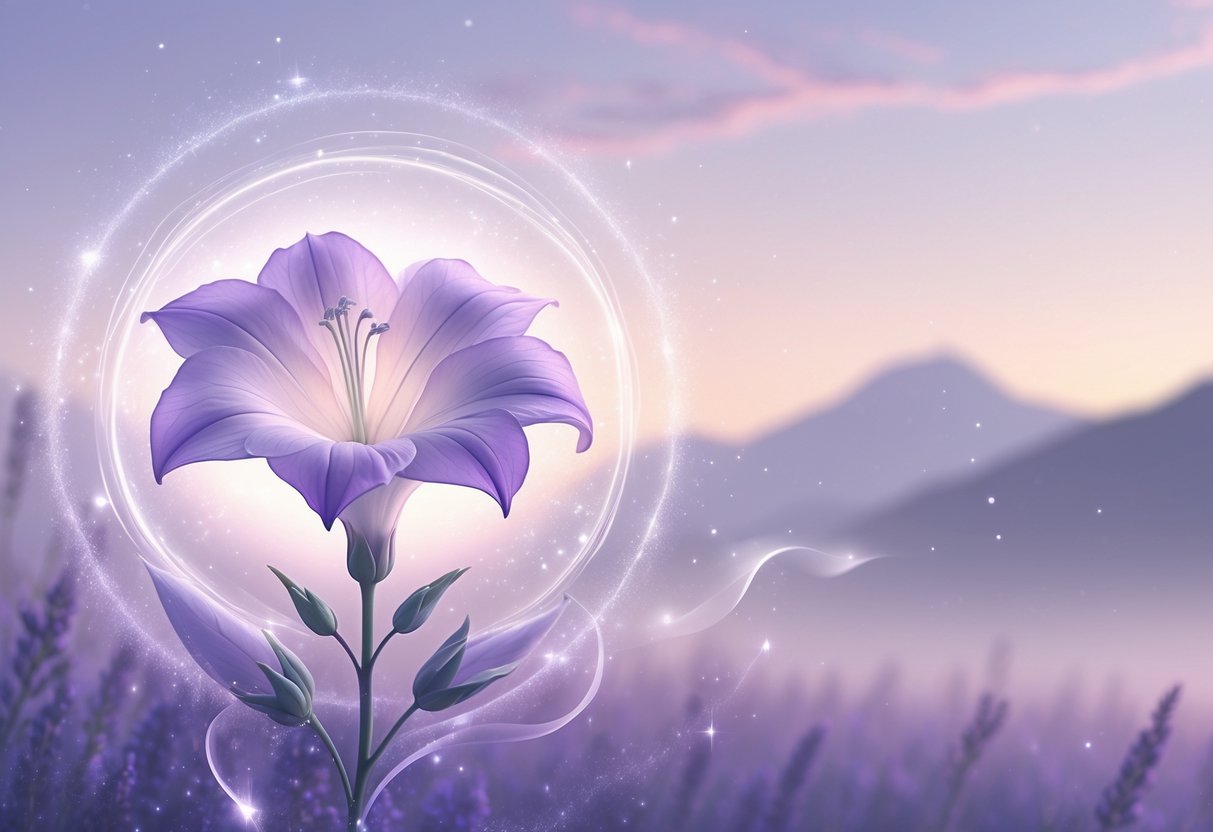
The lisianthus flower is closely tied to deep inner awareness. It helps people quiet their minds and explore their true feelings. Its gentle energy supports clarity in thought and emotional balance.
Lisianthus in Meditation and Reflection
The lisianthus flower is often used to enhance meditation and reflection. Its soft colors and delicate shape encourage calmness and focus. Having lisianthus nearby can help quiet distracting thoughts and create a peaceful environment.
People use the flower’s presence to deepen spiritual practices. It is believed to help open the mind toward higher wisdom. By focusing on the flower’s beauty, individuals may find it easier to connect with their inner guidance and feel more grounded.
Many find that lisianthus brings a soothing energy to meditation spaces. It promotes a gentle yet focused state of mind, helping to reduce stress and increase a sense of spiritual clarity.
Encouraging Soul Searching
The lisianthus flower supports soul searching by inspiring honesty and self-reflection. It symbolizes growth through challenges, encouraging individuals to face their inner truths with courage.
Its association with spiritual awakening makes it a meaningful symbol for those exploring their life path. The flower’s resilience in tough conditions reminds people to persevere as they seek answers within themselves.
Using lisianthus in personal rituals or keeping it nearby can act as a reminder to stay open and curious. This flower helps foster a stronger bond with one’s intuition, guiding decisions based on deeper understanding rather than surface emotions.
Cultural and Symbolic Uses in Spiritual Practices
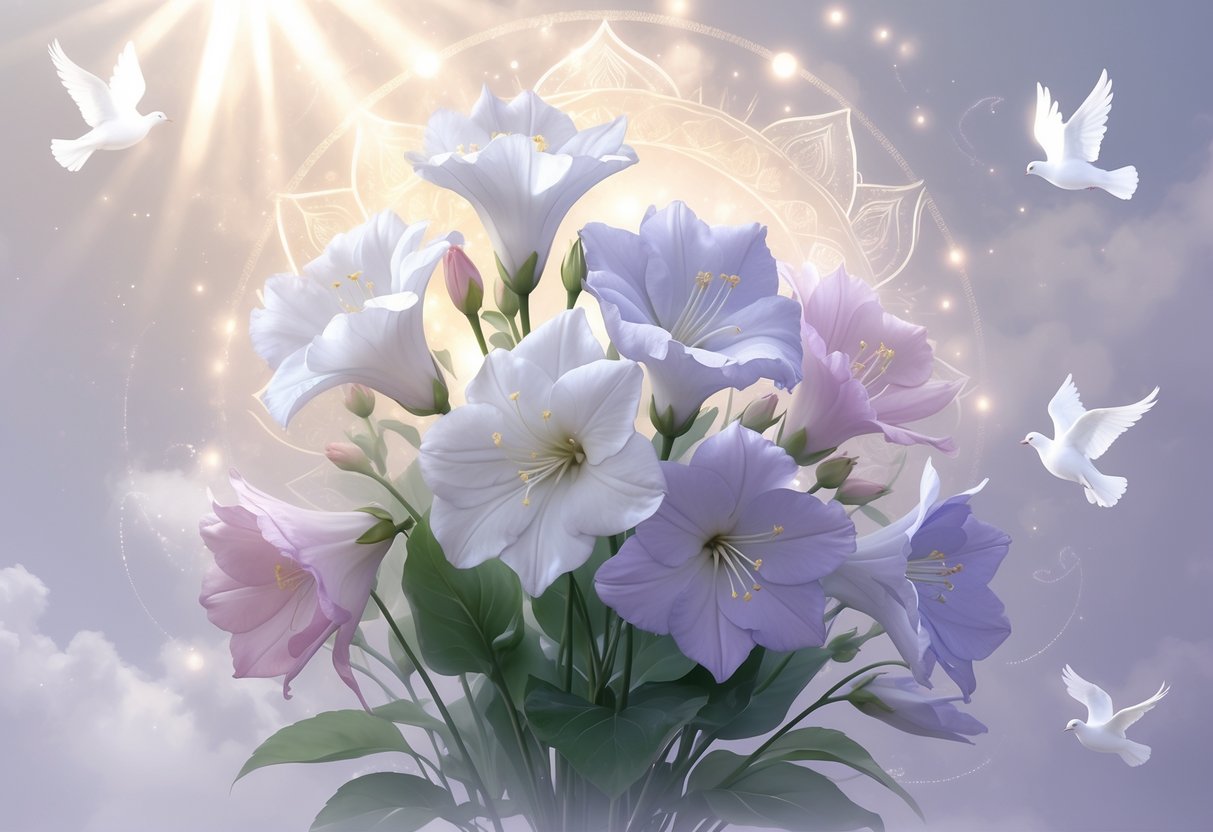
Lisianthus flowers are valued in various cultural and spiritual settings for their deep symbolism. Their use often centers on themes of purity, admiration, and lasting bonds. These qualities make the flowers prominent in important life events and personal expressions of spirituality.
Lisianthus in Weddings and Ceremonies
Lisianthus flowers are commonly used in weddings due to their association with grace, purity, and enduring love. White lisianthus, in particular, symbolizes innocence and new beginnings, making it a preferred choice for bridal bouquets and ceremony decorations.
The layered petals represent elegance and the unfolding of a strong relationship. Couples often select these flowers to honor both the beauty and respect they share. Beyond weddings, lisianthus also appears in other ceremonies, where it conveys admiration and spiritual clarity.
Its presence signifies the deep respect and sincere appreciation that are key to these occasions. Lisianthus can also symbolize commitment and loyalty, reflecting the values celebrated in formal rituals.
Modern Spiritual and Decorative Uses
In contemporary spiritual practices, lisianthus flowers serve as symbols of positivity, inner strength, and calmness. They are often incorporated into meditation spaces and altars to promote peace and reflection.
These flowers are also popular in tattoos, where they represent elegance and personal growth. Many choose lisianthus as a decorative motif to inspire confidence and convey a connection to the deeper qualities the flower embodies.
Color variations add layers of meaning: for example, blue lisianthus highlights tranquility, while purple points to wisdom. This adaptable symbolism makes lisianthus a flexible element in many modern spiritual expressions.
Lisianthus Flower in Everyday Spirituality
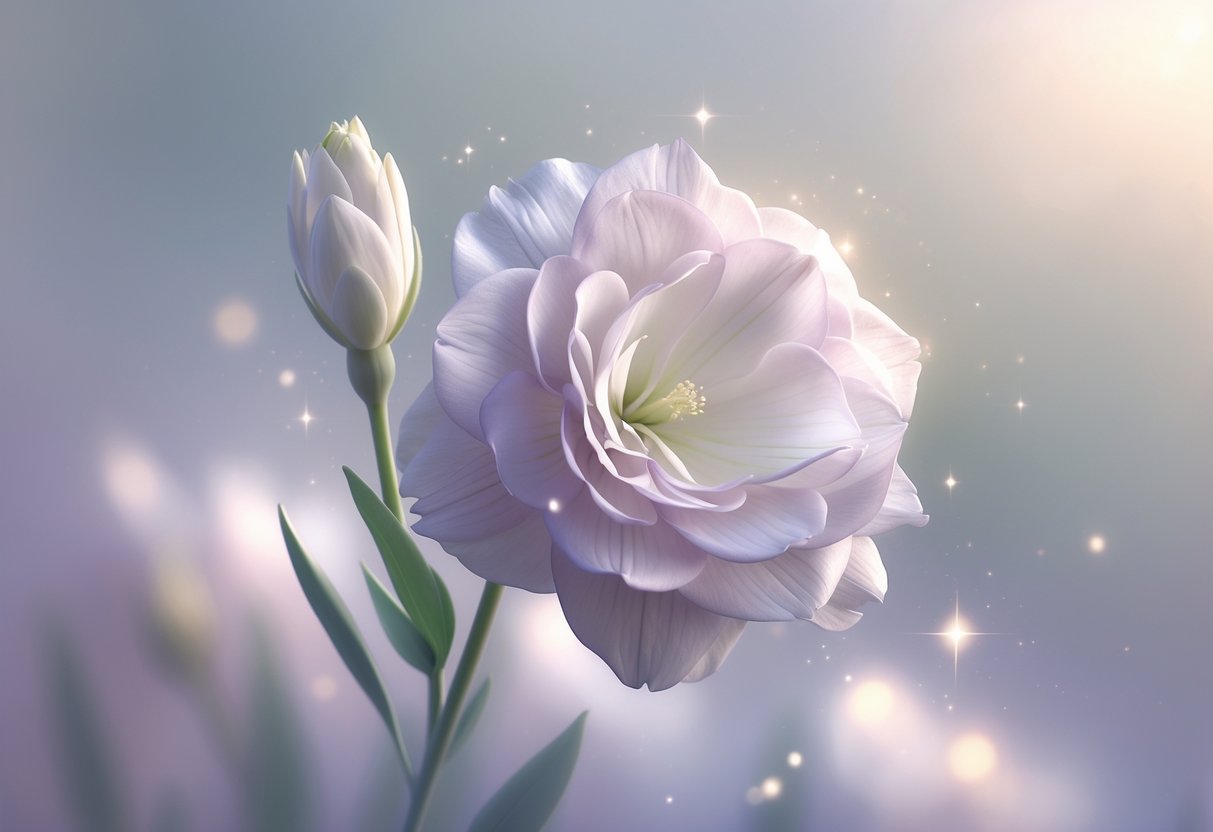
The Lisianthus flower brings grace and peace into daily routines. Its presence can enhance personal spaces and deepen emotional connections. It also serves as a meaningful symbol when offered to others, promoting respect and growth.
Incorporating Lisianthus Into Daily Life
People often use lisianthus flowers to create a calm atmosphere at home or work. Placing them in common areas can inspire feelings of serenity and positivity. The flower’s gentle beauty makes it a natural reminder to stay composed and graceful throughout daily challenges.
Some add lisianthus to meditation or prayer spaces. This can reinforce spiritual focus and encourage reflection on inner purity and strength. The colors of lisianthus, such as white for peace or blue for calm, further support specific intentions during spiritual practices.
Symbolic Gifting and Personal Growth
Gifting lisianthus flowers carries deeper meaning beyond their beauty. They express admiration and respect, making them suitable for mentors, friends, and loved ones. The flower’s symbolism encourages the receiver to recognize their inner qualities like charisma and grace.
Lisianthus flowers also inspire personal growth. Receiving or choosing this flower can remind individuals to practice kindness, maintain confidence, and appreciate life’s delicate moments. This connection nurtures emotional balance and helps build stronger relationships based on respect.
Follow us on Social Media!
I’m Nina, and I’m very passionate about spirituality. Exploring the depths of the soul and connecting with the divine has always been my source of inspiration. Join me on a journey of self-discovery and inner peace through my writing.
